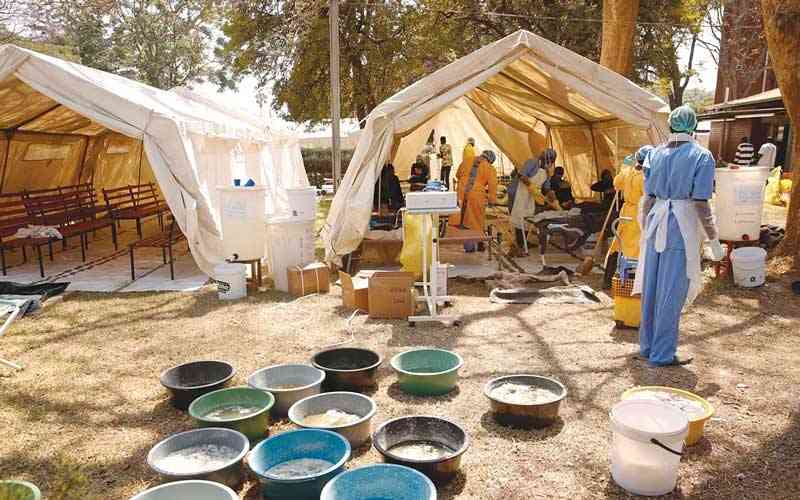
THE United Nations Children’s Fund (Unicef) is appealing for US$10,5 million to support the Zimbabwean government to provide multi-sectoral response interventions to affected and at-risk populations in key pillars: Co-ordination, water, sanitation and hygiene (WASH)/ infection prevention and control (IPC), risk communication and community engagement, case management, surveillance and vaccination, with cross-cutting support for supply, human resources, gender-based violence/prevention of sexual exploitation and abuse in partnerships.
The funding will enable Unicef and implementing partners including Welt Hunger Hilfe, AWET, Plan International, Oxfam Christian Care and Mercy Corps to provide critical humanitarian assistance to three million people in need, including 1,5 million children in the cholera affected areas nationwide.
So far, Unicef Zimbabwe Country Office has received a total of US$2,7 million (26% of the total cholera response funding requirement) from various donors that include ECHO, UNOCHA, US Centers for Disease Control (CDC), Health Resilience Fund (HRF) and Unicef Global Humanitarian Thematic Funds as well as in-kind support from Alliance Media & JCDecaux for digital billboards.
Unicef is grateful to HRF, which approved the reprogramming of US$1,5 million to support Unicef’s WASH, health, and social and behaviour change cholera response interventions.
As of December 19, a total of 12 414 cholera cases, and 273 deaths with a case fatality rate (CFR) of 2,2% have been reported from 54 districts. During the past five weeks, 35 districts reported 5 043 new cases and 72 deaths with a CFR of 1,4%.
This represented a weekly average of over 1 000 new cases with more than 80% reported from Harare (57%), Mutare (14%) and Buhera (12%) districts in Manicaland province.
A decreasing trend in cholera cases has been observed in Harare and Chitungwiza since 27 November (week 47). The recent surge in Manicaland province is occurring among the mining and apostolic religious communities in Mutare district, which is also driving a resurgence in Chimanimani district after a silent period.
An increase in sporadic cases and deaths has also been observed in several districts in Mashonaland East, West, and Central, Midlands and Matabeleland South provinces.
- Letters: Adequately fund social protection
- Care groups breathe life to the vulnerable
- Support group carries Chivi community’s hopes
- Life skills boost confidence of children with disability in Chivi
Keep Reading
Key factors driving cholera transmission include the continued low access to safe water, appropriate sanitation and IPC, health system challenges (staff attrition, capacity, access, and quality issues), unsafe burial practices, lack of oral cholera vaccine in the current response, multiple outbreaks (polio, measles), and funding deficiencies challenging all response pillars.
The country has entered its rainy season (October to March) raising fears of escalation. In addition, subregional population movements and large gatherings for economic, cultural, and religious reasons amidst ongoing cholera outbreaks in neighbouring countries (Zambia, Malawi, Mozambique) present continued risks for cross-border transmission.
Children, women of childbearing age, religious decliners, illegal miners, and farmers in rural settings are high-risk groups for cholera outbreaks in Zimbabwe. The forecasted El Niño-induced drought will cause further water scarcity complicating the situation. Cholera caseloads reported thus far are higher than the 2018/19 outbreak with fears of a comparable situation to the major outbreak of 2008/9. In the most likely scenario, World Health Organisation/Unicef estimate an attack rate of 0,3 resulting in 38 763 cases by February 2024, if current interventions do not halt transmission, noting that cholera attack rates are typically higher in urban and peri-urban areas than in rural settings.
As part of the cholera response, the Unicef ESARO regional director conducted a vital visit to the St Mary’s Cholera Treatment Centre in Chitungwiza, where she engaged with the local community, local authority and Oxfam — a Unicef partner — to understand ongoing response efforts. She also provided valuable technical support and insights in mitigating the spread of the outbreak.
During the reporting period, Unicef hosted an information management training session for 36 WASH personnel to enhance data analysis and planning skills. Unicef also conducted a capacity assessment and led the co-ordination of WASH partners to standardise hygiene kits and volunteer incentive packages.
Over the past week, Unicef has supplied safe water to 21 775 people by rehabilitating 10 water points in Chitungwiza and three in Zvipiripiri area in Mutare district. Unicef delivered borehole spares to rehabilitate an additional five boreholes in Zvipiripiri. Notably, Unicef and Mercy Corps repaired the solar inverter for Zvipiripiri Health Centre’s water system, thereby ensuring safe running water at the CTC. - Unicef







